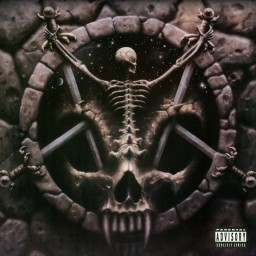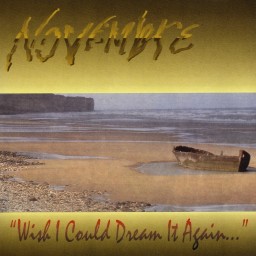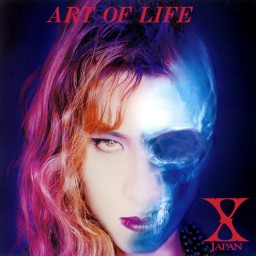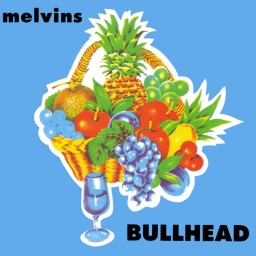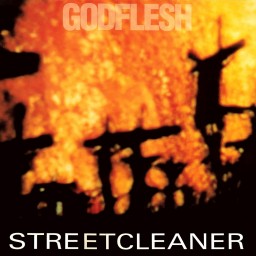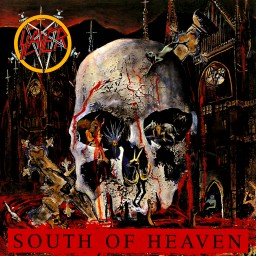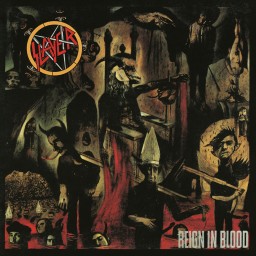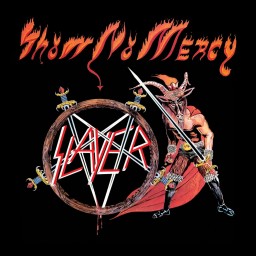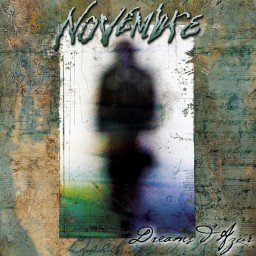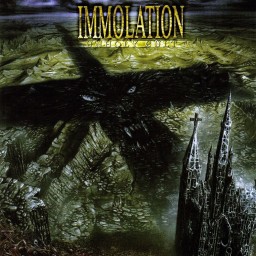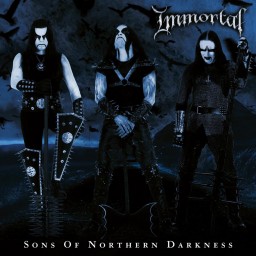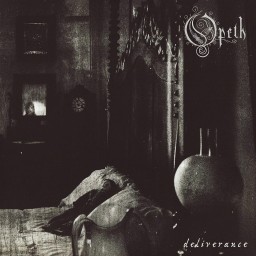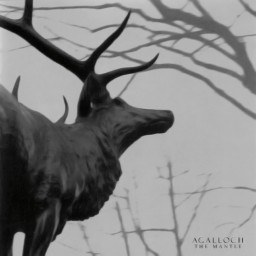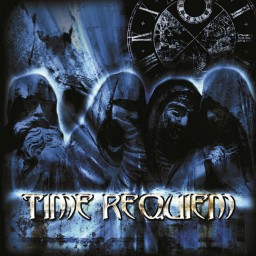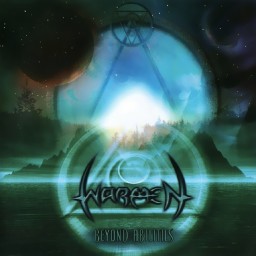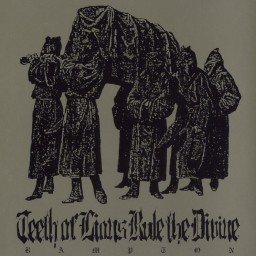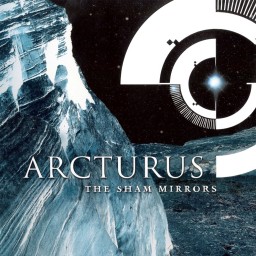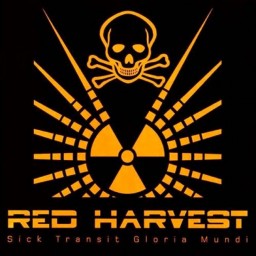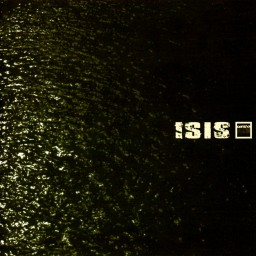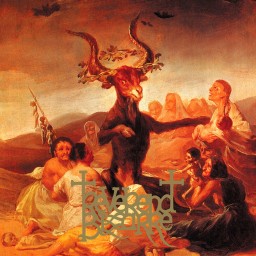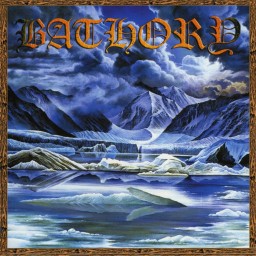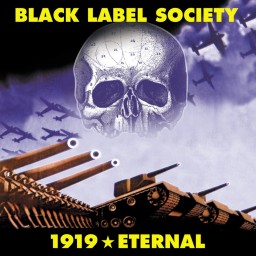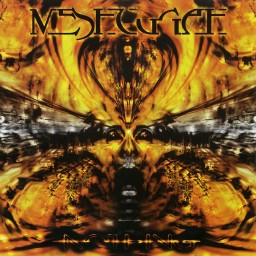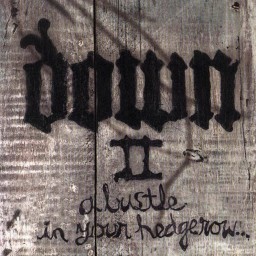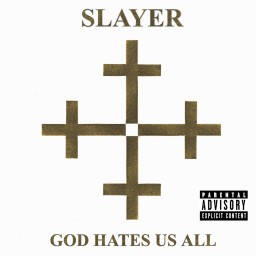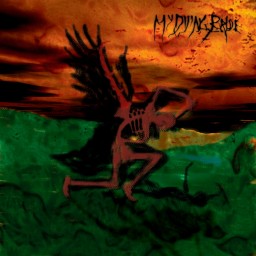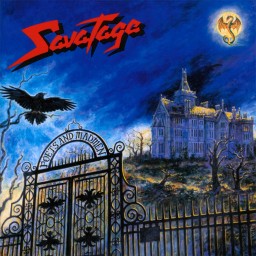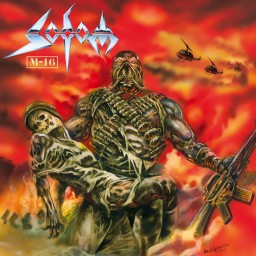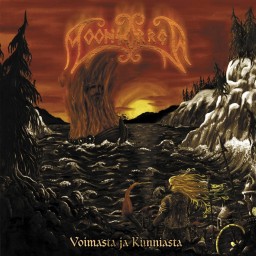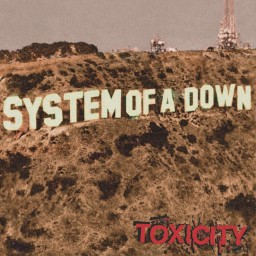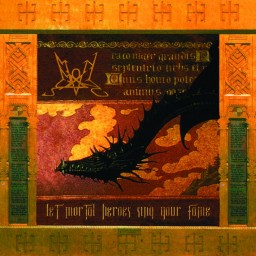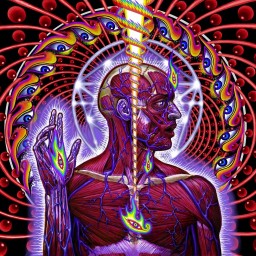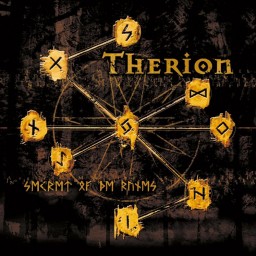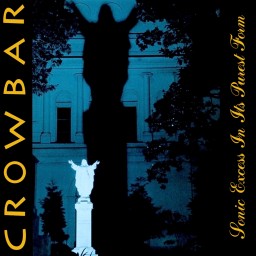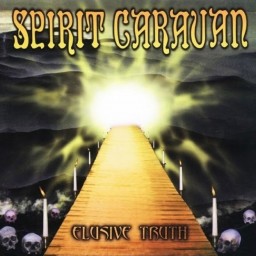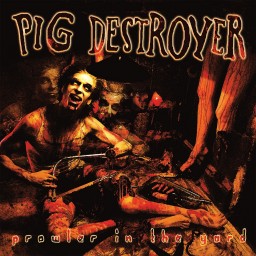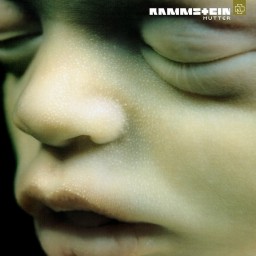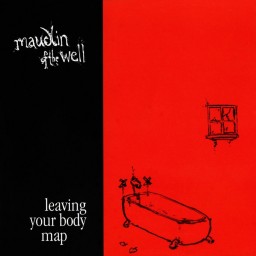SilentScream213's Reviews
Divine Intervention has remained not only my favorite slayer album, but my favorite album of all time since I heard it in my freshman year of high school, 2010. Not that it immediately became my favorite album upon first listen – no, this is a slow grower, but a very easy album to come back to. And come back to it I did, many times; I’m sure this is in my top 10 most listened albums of all time, and a certain contender for the #1 spot.
But, why Divine Intervention?
Why the album AFTER Slayer stopped being the greatest Thrash band in the world? After the lineup change and the death of metal in the 90’s? The album with troubled production and almost no live representation?
Quite frankly, because I don’t give a damn about any of that stuff.
I speak with utmost sincerity when I say I think this album is absolutely as great in every department as the 5 preceding it. The only exception being that the production is lower quality, but you know what? That higher class sheen on Seasons in the Abyss never did it for me as much as the raw, honest sound that we get here. The complaints about the production quality are completely unfounded if one enjoys Show No Mercy, or Kill ‘Em All, or basically any Black Metal.
With sufficient clarity on why none of this album’s “weaknesses” bother me, let me now express why I love it so much.
The mood. The atmosphere. The writing. Slayer were always that too evil band that were somehow mainstream. From day one they were writing about Satan, demons and infernal hellfire, and they remained consistent in that approach throughout the 80’s, with growing themes of real horrors as well, including war and mental illness. However, on Divine Intervention, hell froze over. The hell fire faded and the demons gave way to a much more terrifying being – humanity. Strongly influenced by literature about serial killers as well as newspaper articles, Tom Araya took a stronger writing role here and focused almost exclusively on real world evil and suffering. Songs took a deeper look into the psych of serial killers, criminals, and even drug abuse on the closing “Mind Control.” The riffs followed suit, and as such, this album isn’t as flashy as their previous material, and I think that gets lost on a lot of people. The riffs here are cold and calculated, evoking sincere darkness and an unrelenting bleakness that remains consistent throughout the entire album.
Which leads to an immense strength of this album; the songwriting. Hints of Tech Thrash break through in many of the tracks here, with less conventional rhythms courtesy of Paul Bostaph taking the songs into twisting territory that deviates far from their simpler punk roots. The guitar solos on this album are actually good, and more often than not add to the song with more thoughtful melodies as opposed to pure chaos. The title track and closing track both have perhaps the best solos by the band, and truly these songs felt like they had gained a level of maturity and depth in their structure. Tom’s vocals are also the most aggressive, manic and eclectic he has ever laid to record; in title track “Divine Intervention” he pushes his yelling to its limit, and haunting “Serenity in Murder” allows his lower registry to croon wickedly between more thrash roars. Divine Intervention could easily be argued to be Slayer’s heaviest album, which cannot be said for most metal releases from bands that were “declining” in the 90’s.
At the risk of sounding crazy, I’ll also confess that the insanely dark lyricism and mood on this album, particularly on tracks like “Killing Fields,” were immensely helpful for me emotionally. Since I discovered it, Metal has always been an extremely cathartic way for me to deal with negative emotions. Divine Intervention did that better than any other album I’d heard, and still remains one of my weapons of choice when I need it. People don’t usually label Slayer as being emotional music, but they probably forget that anger is an emotion. Some people have their OK Computers, some people have their Dark Side of the Moons, and I’ve got my Divine Intervention.
Genres: Thrash Metal
Format: Album
Year: 1994
A volte-face to anyone who thinks Doom Metal can’t be energetic and exciting, and a great lesson in what makes true Doom a completely different beast from Trad Doom. Wish I Could Dream It Again is one of the earliest true Doom albums, having zero Sabbathian influence, none of the 80’s Doom groove, and a total focus on somber, melancholic atmospheres. And unlike most prior Doom bands, it doesn’t rely on being consistently slow to achieve this. Lethargic, doomy sections still run through the compositions, but a lot of this material is lively, especially the rhythm section. Simple melodies and morose chords permeate the songwriting, but that drumming ensures a complex and ever-changing foundation to the music.
Novembre also have very melancholic lyrical themes, sticking to the introspective and poetic, drawing upon aquatic, summery and warm imagery across the album in another first for Doom Metal. The sentimental mood here was pretty unique at the time, but the general melancholy on display became a staple for the genre. Doom bands had already begun adopting this focus on gloomy atmospheres, which is how true Doom was born in the early 90’s, but Novembre here upped the ante. This was probably the most melancholic metal album at the time of its release.
As debuts can be, it’s a bit rough around the edges in some places; the clean vocals in particular are quite amateur, though they don’t bother me at all because they perfectly encapsulate that morose feeling of Doom. Either way, a landmark release for the genre, and a great learning experience for those who aren’t privy to the great variation that can be found in Doom Metal.
Genres: Doom Metal Progressive Metal
Format: Album
Year: 1994
If I had to pick one song, not as my personal favorite, but as the best piece of music – one that pulled from all aspects of what makes music such an mazing and beautiful art – it would be Art of Life. As pretentious as that sounds, and as pretentious as writing a 30 minute epic about life may be, this song can actually back up such a monumental title. Am I biased as a metalhead, a fan of X Japan? You bet. But I only love these things because of what they offer me. Metal, to me, is ultimately an incredibly raw, even bestial display of human art. The harshness and aggression of it feels like a death throe. When one is in a life-or-death situation, or pushed to their limit, or faced with overwhelming emotion or psychological trauma, the ugliest, yet purest expressions surface. This is what Metal is to me.
X Japan do a fantastic job of mixing into that Metal foundation the sonic embodiments of young love, of beach sunrises, city-lit snowfall, a tear of joy. They have mastered both the ugly aggression and the passionate beauty, each in excruciatingly pure form. “Art of Life” is their magnum opus that displays every talent they’ve mastered. At times the music gets insanely fast as the guitars and drums exercise every last shred of pain, and at others slows to let the piano and strings cover you like a gentle rain. The song goes to all extremes and everywhere in between.
The lyrics are poetic, evocative, and hold an immense amount of depth especially for a band writing in a second language. Band leader and main writer Yoshiki was going through the grief of losing his father, among other things in his life, and in his words, tried to draw from every emotion he had when writing the song. And yeah, he succeeded, without a doubt. This is conveyed both in the music and the words, which tell of an existential crisis of love, longing, and loss. The lyrics are not specific enough to pigeonhole the song, and therefore almost anyone could listen to this and attach a very personal meaning to it.
Lastly, I’ll talk about that piano solo. That god damned piano solo. Originally, I hated it. I didn’t get it, I didn’t respect it, I didn’t think it contributed to the rest of the song, nothing. I went out of my way to make an edit of the song that cut it out so I could listen without having to fast forward through it. I didn’t get it.
I do not like when people chalk someone’s dislike of something up to them “just not getting it.” As if a song is so transcendental that a human cannot understand it. As if one has to be “in” on something to judge it correctly. As much as I do not like that and do not think it is a good response to any sort of opinion, I will allow myself to say it just once, for this piano solo. I get it now. After going through a psychological and emotional low, I got it. It became so clear what Yoshiki was feeling as he hit that cacophony of keys, how it played into the rest of the song, what it represented, everything. And magically, I immediately started enjoying it. I absolutely cannot listen to the song without it now. It took an experience and a perspective I did not have before to grasp it. And while this is no fault of any listener and I would not wish it on anyone, if you haven’t had that sort of experience, you just might not get it.
Genres: Power Metal Progressive Metal Symphonic Metal
Format: EP
Year: 1993
Bullhead is usually considered Melvin’s first truly great album. The Sludge Metal pioneers are relatively peerless in this era, as you could count the number of notable Sludge bands on one hand when this dropped. These circumstances made Melvins kings of the movement by default, and I think that’s why it doesn’t really appeal to me.
Bullhead is an album that is special by circumstance, because it had no competition and no comparison. It was influential and unique, but those things don’t matter to me when I’m listening to it. The music itself is very basic, monotonous, and droning. These qualities can be fine when done right (or if that is your taste) but I feel this album just doesn’t have enough going on to warrant much entertainment out of that. There aren’t any great riffs, no striking vocal performances, no rhythm grooves, its just a lot of repetitive heavy chords. It’s slow, but it’s certainly not doomy, because there’s no atmosphere and no strong mood aside from kind of anxious.
Unfortunately I have yet to find much enjoyment out of early Sludge, and this album was not the one to change my mind. Onward we go.
Genres: Sludge Metal
Format: Album
Year: 1991
Sometimes when you listen to one of these acclaimed albums and don’t like them so much, you can still see what makes the album so great. You can recognize what other people see in it and write it off as just not being your thing. But sometimes, you might just be left mystified, wondering “What am I missing?”
Just before Streetcleaner, I had been listening to Peter Gabriel’s Passion, one of his most revered releases and a widely acclaimed New Age/World Music album. The album didn’t do anything for me, mostly because I’m not a fan of the style of music. However, I could still acknowledge the great compositions and brilliant atmospheres crafted in the soundscapes, and it was no mystery to me why it is so well liked.
Streetcleaner is a different case. I love metal. I love dark, misanthropic, heavy music. But listening to Streetcleaner, I struggle to find any appeal at all. The songs are all incredibly simple, and it sounds much less like a performance and much more like each member came up with one loop and just had it repeat for 5 minutes. There’s nothing innately wrong with this, but if you’re gonna repeat something for so long, at least make it good. The riffs are barely there; boring, slow, uninspired guitar that does little other than add a sludgy atmosphere, and ditto for the bass. The drum beats are equally boring and uninspired, and aside from some occasional addition of double bass, never do anything interesting. The vocals are sometimes there, and that’s all I can say about them.
The album is certainly dark, but the problem is that it is not active in achieving this. All the music is incredibly passive, and by that I mean there’s a lot of nothing going on aside from sounding heavy and dissonant, and it becomes the listener’s job to project any actual mood to it. The music doesn’t invoke anything on its own, but rather acts as a pool to collect such projected feelings. Unique at the time, and influential for everything that came after… but I’d say this is another case of influenced far surpassing the influencer.
Genres: Industrial Metal
Format: Album
Year: 1989
South of Heaven was my first favorite album. The first one I ever listened to while thinking “god damn, this is music for me.” I had never heard sincerely dark or heavy music before that, and I never looked back.
It all started with my first videogame, DOOM. I played that game when I was just 2 years old – I worked the gun while my father did everything else, but it was still an incredibly memorable experience that was burned into my memory. I didn’t play the game for a long span of time because we had to get rid of it after Columbine happened, and then it became kind of a pipe dream to be able to play it again.
It was actually right as I was entering public school in 8th grade (I was homeschooled prior) that we managed to get the game again. Man that was a triumphant moment, and the game was just as great as I remembered. However, one thing that struck me was the music – holy hell, that music kicked ass.
I wasn’t even into music yet at this age. I listened to The Beatles, I listened to whatever the parents had, and I didn’t really listen too intently. I didn’t even know what metal really was, other than hearsay. But I LOVED this game’s music. I went to shady websites to download mp3s of the game tracks, and naturally, I started reading up about it more. Well it turns out a ton of the tracks are based on real songs by real bands – all metal bands I had never heard of save Metallica. I had to get this stuff.
I actually downloaded all of the original songs without listening to any of them first, bought my first mp3 player, and then listened to them all at once. It was a rite of passage of sorts. I loved everything I heard, even the gruff stuff like Pantera, who’s vocals were too much for me but the riffs were good enough to get through it. This new form of dark, aggressive music was striking all my chords, even though I had no experience with it. But at the end of the list – as the bands were in alphabetical order and there were only 10 or so – was Slayer.
Slayer hit different.
The three songs from DOOM were “South of Heaven” “Silent Scream” and “Behind the Crooked Cross” and they instantly became my favorite songs (barring “The Long and Winding Road", which will never not be one of the most beautiful songs ever). Such condensed aggression and evil had never struck me in aural form like that before. I mean, even Pantera, who were just as heavy, didn’t sound nearly as dark and evil as this. And the lyrics! Holy hell, they were actually disturbing at that age. A song about abortion – what the hell was that. And I loved them.
Finding that the songs were all from the same album, I got it immediately – digitally, physically, everything. I didn’t even know what riffs were before this! This was insane to me. The whole album was just as good as the few songs I’d heard. I easily listened to it at least once everyday for probably the rest of that school semester. And it ended up being really important in me finding my identity in a crucial period of life – I now knew that metal was my passion. I knew what kind of music I liked, I could talk about it, I met people through it, and I searched for more.
The funny thing is, though Slayer remains my favorite band, their other material didn’t click with me at first. Turns out this album was Slayer at their slowest and most melodic; if I started with any other album, I may not have been infected so easily. But yes, it was South of Heaven that turned me into a full-time metalhead, and it was the first album I could confidently say was my favorite. Listening to it while writing this review, I’m not surprised in the slightest that it gives me the same feeling of intense bliss as it did nearly 10 years ago, still comfortably sitting among my favorite albums of all time.
Genres: Thrash Metal
Format: Album
Year: 1988
At exactly 19 seconds into this album, you can feel what it's like to have your skin melted off your face from the inside out.
What the fuck are you waiting for?
Genres: Thrash Metal
Format: Album
Year: 1986
I’ve always loved Slayer, this album being among my favorite releases by them, but it becomes so much more amazing when compared to the contemporaries at the time. Absolutely nothing was this insane – not even close.
Speed? We had Metallica, but they’d only go into overdrive on a couple songs – and even then, it never matched Slayer. Tremolo guitar picking has never been this fast. And Dave’s drumming was something else. The speed and technique of the drumming here had never been seen in metal before. I’d guess only some Jazz and the best Prog Rock drummers had the level of chops Dave put on this album back in 1983.
Riffs? Hell no. You think Paranoid had great riffs? Number of the Beast? They were all lacking something. Slayer doesn’t just deliver riffs – they deliver evil riffs. Wailing, screaming guitars walked the line between melodic and chaotic, bringing a perfect harmony of very catchy riffs and a dark, harrowing mood. No music sounded this dark and melodic at this time; any other bands attempting the evil schtick relied on purely being noisy and chaotic with little technique (Venom, Hellhammer).
And then there’s the vocals. Not just the style, but the delivery. Tom’s trademark yelling here has become something often imitated, and I daresay it was many people’s introduction to harsher vocal styles. Tom was not the first to employ a harsh vocal style (Venom, Black Flag), but he absolutely did it better than anyone else at the time. He brought just the right amount of melody to the table; he can hit notes, and his words are very intelligible. Despite that – or perhaps, because of it – his bark comes off as much more convincing. As opposed to the flat screaming or growling of bands like Hellhammer and Venom, you could discern emotion in Tom’s voice, and that emotion was anger, hatred, a general misanthropy and dedication to the dark arts. That delivery carries over to the lyrics – again, Slayer were not the first to write Satanic lyrics. Venom mostly started that, but they didn’t take it too seriously. Slayer, along with King Diamond, were really the first band to convince you that those lyrics about Satan, murder, and black magic were genuine. Of course they weren’t, but damn was Tom’s fierce, rabid bark convincing.
Back in 1983, there were absolutely no albums that matched this. Any other album that had traits of what makes this great was missing something else, whether it be the speed, aggression, technique, or mood. Slayer was the first band to unite these qualities in a way that would spawn a staple style of dark metal carried on by thousands of bands.
Even after listening to hundreds of albums that were released pre-1983, Show No Mercy remains chronologically my earliest 5-star release, and nothing up until that point in music has come even close to instilling in me the sense of awe as Slayer did with their debut.
Genres: Speed Metal Thrash Metal
Format: Album
Year: 1983
Dreams D’Azur is a re-imagining of Novembre’s debut album, Wish I Could Dream it Again… The album is completely re-recorded with new compositions and played in their newer style. Wish I Could Dream it Again… is a Death Doom record through and through, while this one trade some of the Death Doomy sound for a more contemporary Progressive Gothic Metal sound, though still retaining the Doom influence.
The biggest weaknesses with the debut were the rough production and amateur performances. It goes without saying that both issues are completely mended here. Through the years, Novembre have adopted a smooth and lush production style that contrasts and compliments their heavy style, allowing for dense compositions that sound fantastic. The bass is given especially great treatment on this album, being very audible and having plenty of excellent lead parts. The playing as well has improved dramatically, with the band transitioning from a slightly messy, green footed band to masters in their genre. The drumming on this album in particular is the best in the band’s career up to this point. The poor clean vocals from the debut are improved with harmonized, reverby vocal lines that act more like another layer of instrumentation.
What about the compositions? One issue the debut had absolutely no problem with was compositions. Novembre were already crafting amazing songs right from the beginning, and in my opinion the debut still stands on its own as an amazing Death Doom record. Here, the compositions become a bit denser, with scant layers of synths and more atmospheric guitars weaving in and out of the compositions, crafting a much more dreamy and surreal feel than the debut. From a technical standpoint, the compositions are improved quite a bit, and have more going on in each track to add to the density.
However, I will say, it’s a trade off for me. While almost everything has improved in terms of quality, I do find myself… preferring the original style. Progressive Death Doom is, to me, preferable to Progressive Gothic Metal. I loved how heavy and melancholic the original songs were, how they charged forth with energy rare to the genre but carried intense gloom and beauty. As I said before, these compositions lean a bit further to the “dreamy” side of things, and they definitely still sound amazing. But, unlike a lot of people who think this album completely negates the debut, I see different strengths in each, and this far from eclipses the original in my eyes, instead offering a different take on the incredible compositions.
Genres: Gothic Metal Progressive Metal
Format: Album
Year: 2002
Absolute legends of riff-oriented cavernous Tech-Disso-Death release another masterpiece.
Immolation is such a special band because they are technical and dissonant, yes, but they never let that come before the fact that they are extremely dark, atmospheric and moody. In fact, they utilize technical and dissonant songwriting to further add disorientation and disturbance to the listener, but not so much so as to prevent the songs from being extremely memorable and digestible.
Unholy Cult is a continuation of the band’s previous sound, meaning you can expect some of the heaviest, densest, most well-composed music out there. However, I think the album does manage to stand out from the predecessors in some key ways. Chiefly, the atmosphere on here is crazy. Layers of dissonant guitars create a sublime cacophony of perpetually disturbed darkness that feels like a thousand hands dragging the listener into the depths of an abyss. It’s astounding how much they do with just a traditional Rock ensemble, as even without keys, pads, or symphonic elements of any kind, they construct masterful caverns of sound that feel absolutely massive and crushing. The interplay between guitars, both dissonant and harmonic, is nothing short of genius.
That’s not to say the other members of the cult are outdone. The drumming on here is flawless; incredibly varied, technical, complex, power… yet not overdone. In fact, the drums go about as far as they can without sounding like they are doing too much. The endlessly impressive fills and pummeling blast beats are spaced apart by slower or more conventional sections that last only long enough to ensure the songs are never without clear structure. The drummer also has a wonderful habit of playing technical parts with the sticks while keeping a constant, unbroken stream of double bass to maintain a cast-iron foundation to the chaos.
The bass adds a wall of pressure to the atmospheric and moody density, focusing on filling out the low end with an ominous weight that is not as immediately noticeable, but nevertheless just as important in ensuring the thing sounds denser than tungsten. The guitar leads tend to get quite high and piercing at times, so the 6-feet-under bass does a great job at complimenting and contrasting those. The vocals are also essentially perfect guttural growls, fantastically enunciated so each of the superbly written lyrics shine through. I can actually hear a few moments here and there where the vocalist just barely has time to breath between delivering lines and I love that so much because so many harsh vocalists who deliver fast screams will just do separate vocal takes for each line and throw one next to the other to compensate for the fact that they could not actually do such a feat in reality. I’d rather hear a little bit of natural struggle and know that it’s all real, like I do here.
One more thing that ties into the focus on atmosphere on this album – the band is a bit more inclined to flirt with Death Doom in a few spots. It’s lovely every time they do because they’re essentially Incantation on cocaine when that happens – twisted, cavernous walls of twisting and turning dissonant guitars.
Probably their most consistent album… perhaps my favorite thus far.
Genres: Death Metal
Format: Album
Year: 2002
Immortal continue their style of riff-driven Black Metal, still heavily influenced by Thrash. And it’s still delicious.
Honestly, there’s not too much to say about the album if you’ve heard the previous few. Perfected Black-Metal shrieks that are low, intelligible and strong – check. Fantastic riffing finding that sweet spot between dissonant and melodic – check. Walls of Black Metal Tremolo picked guitar – check. Rhythm section that is technical and varied far and above the standard for Black Metal – check. Bass that can be FELT – check. Lyrical endeavors that are on-topic yet serious, epic, and triumphant – check. No weaknesses and every strength one could hope to find in the genre.
There was just one thing that stuck out to me about this album, and that’s the fact that the production is so damn HEAVY. Most Black Metal albums have paper thin production, and even better produced stuff usually leans on the treble-heavy side of Metal. Sons of Northern Darkness feels like a sledgehammer of solid ice bashing your head in repeatedly. You can really hear the power of the drums and bass crushing you under their weight. I can’t quite recall whether or not the previous records had such power on the production end, but this is probably the best production I’ve heard on a Black Metal album. Mind you, it’s not overproduced at all. There’s still chilly walls of buzzing guitars, and even the leads have an aspect of messy imperfection to them. It still sounds natural, sounds like Black Metal – but God is it powerful.
Genres: Black Metal
Format: Album
Year: 2002
Deliverance. Opeth’s last Death Metal record, and one of the heaviest of their entire career. In somewhat uncharacteristic fashion for the band, opening track “Wreath” drops you right into the onslaught of pummeling rhythms, deathly screams, and one of the most ominous riffs the band ever wrote. The increasingly complex and odd-timed songwriting here just makes everything that much more disorienting – “Wreath” is a straight up challenging song that mixes the heaviest and brainiest of Opeth’s compositional prowess into one package that just completely annihilates you.
After that, you’re given a bit of space to breath… kind of. While “Wreath” is definitely the heaviest and most aggressive song on the album, that’s not to say the following tracks are worse in any way. Title track Deliverance focuses on pushing the band’s technicality and complexity to its limit, an over 13-minute epic of masterful musicianship and songwriting. “A Fair Judgement,” not forgetting what makes this band so special, reintegrates deeply melancholic moodiness, a Doomy dirge of Prog that shows the band had not sacrificed their emotional depth when honing their technical abilities and pushing the complexity of their songwriting.
The album is, pretty consistently, dark, ominous, heavy, and complex. More so than any of their previous albums. For that reason, it’s definitely a bit of an all-or-nothing affair; it’s the perfect fix if you’re in the mood for some uncompromisingly dark and brainy Progressive Death Metal – if not, prepare to drown in its unrelentingly ominous waves.
Genres: Progressive Metal
Format: Album
Year: 2002
I was quite blown away by Agalloch’s debut album. Despite the music being relatively simple, they were already masters at crafting melancholic guitar leads and somber chord progressions that evoked a dark, emotional atmosphere. The songs were so memorable they sounded like a band that had long since mastered their craft rather than a debut. I had high hopes for their next album.
The Mantle is usually regarded as not only the band’s best, but one of the greatest Metal albums of all time, particularly standing as a monolith of Post-Metal. However, the first thing that stands out about this album is that not only is there a lot less extreme Metal (Black Metal influences here are relegated to secondary) but there’s also just a lot less Metal in general. There is so much Folk (primarily Neofolk and Dark folk) that it competes with Post-Metal as the primary genre for the album.
Thanks to this folkiness, the album is exceptionally pagan and nature-oriented, the whole journey feeling like a lonely camping expedition in the dense Cascadian forest mountains of North America. Constantly stumbling upon native burial grounds and bygone mythology while trying to escape the thoughts and feelings of the girl who just left you. This is all captured in spades, and the shift in sound from their debut creates a far more unique experience that even today remains an enigma.
The songwriting for the most part weaves acoustic passages both between and within the Metal tracks, layering guitars atop one another as they build towards crescendos. Many simple but effective guitar melodies will slowly change and build upon each other in a slightly droning fashion, resulting in a smooth ascension towards harmonic peaks. There ARE still extreme Metal sections left, and such passages with black shrieks and pounding double bass drums provide much needed energy and aggression to the otherwise passive music.
Now for all its praise, I must say, the album was a slight disappointment and step down from the debut for me. Some of the acoustic oriented tracks just sounded a bit too generic – like your average campfire dude with a guitar playing the 6 chords he knows. There is a lot of instrumental stuff here, and while some of it is exceptional (Odal, the second half of The Hawthorne Passage), other tracks just feel a bit pointless (A Celebration for the Death of Man, The Lodge) like they don’t have a strong enough idea to make them their own song, and would have been better worked into a longer track rather than standing on their own. The lyrics and vocals are quite enjoyable for me, so the final track A Desolation Song is quite good thanks to the personal, introspective lyricism despite the exceedingly simple music; the aforementioned instrumental tracks are sorely lacking because they don’t have any poetic lyrics to make up for their uneventful songwriting.
Another thing I will say – the shift away from extreme Metal towards Folk, and much of this album being clean and acoustic, makes it FAR more accessible. I have to wonder if the only reason it’s considered such a masterpiece is because it can be enjoyed by far more people than a Black Metal album can.
Let there be no mistake though; this is a FANTASTIC album. The ONLY reason I have some harsh words for it is because I am coming off of their incredible debut, and had my expectations set to the sky. If I had heard this one first, I think it would have blown me away in a totally different way. Incredibly unique experience in the Metal spectrum. I recommend this one for a nature hike in winter.
Genres: Folk Metal Post-Metal
Format: Album
Year: 2002
Always love to hear Neoclassical acts that are actual bands rather than First Name Last Name guitar (or keyboard) heroes. As you might expect from a Neoclassical band, Time Requiem is filled to the brim with awe-inspiring solos that boggle the mind. But not just from the guitars.
Yes of course, the guitars are majestic. The smooth running up and down scales while essentially tremolo picking is just wild to me. Thankfully, the guitars do much more than that, offering great riffs and more traditional style guitar solos as well that offer more depth than Yngwie-style wankery. Keys are another key component (ha) to this lineup, and yeah, the keyboardist does some insane wizardry that could put any classic pianist to shame. I mean, the keyboardist is the composer, so not only is he an absolute madman at his instrument, but he’s a strong songwriter as well. Keys and Guitars duel here, but they also give each other space to show off without competing for the spotlight depending on the song.
But this album isn’t just a melodic showcase! The RHYTHM section is also flashy as hell. Obviously harder to hear, but the bassist is putting in some crazy work on this thing. It can best be heard in the mind-blowing ending to “Brutal Mentor” (which in itself is just one of the best displays of technical musicianship I’ve ever heard). And the drums! God those drums are great. Speedy, technical, progressive, and doing the perfect amount of showing off insane chops without overplaying. And of course, lets not forget the vocals. Vocalist Apollo was in one of my favorite short-lived Neoclassical bands Majestic, and he helped elevate their accessibility with fantastic choruses. He does the same here.
For anyone who enjoys technical prowess in musicianship and songwriting, a must-listen. For those who don’t, it’s thankfully full of great songs that are well-written and worth much more than their technical prowess alone.
Genres: Neoclassical Metal Power Metal Progressive Metal
Format: Album
Year: 2002
Some nice words that could be used to describe Beyond Abilities would be insanely technical, melodic, and proficient. All the musicians here are experts at playing, and they waste no time showing that off. The keyboards are the focal point, with playing that rivals any masters of the Classical Era. Nods to Mozart are made throughout, so it’s obvious what the influences and aspirations are.
Some less kind words that could be used to describe Beyond Abilities would be sterile, emotionless, and generic. The musicians may be masters at playing, but they can’t evoke an emotion to save their lives. In fact, the only song that evokes any emotion is the cover of Alone. The songwriting is the bare minimum for Neoclassical Power Metal fare, which is quite a demanding genre; this means the band does nothing to stand out from contemporaries. The playing may be perfect, but that only goes so far. As someone else pointed out, everything sounds like it was made in a factory.
If you’re a fan of Neoclassical Power Metal, like I am, it’s a nice, enjoyable album. If you’re a fan of technical prowess exercised through music, this is admirable and probably of great interest to aspiring keyboardists. If you want something new, unique, memorable or moving, move along.
Genres: Neoclassical Metal Power Metal
Format: Album
Year: 2002
What I like: The lyrics! Especially to the opening track “He Who Accepts All That Is Offered (Feel Bad Hit Of The Winter).” I love how hateful and humbling they are, offering so much vitriol towards the over-glorified, hedonistic lifestyle of drug use that finds itself abundant in rockstar and alternative culture. The filthy, ominous sound of the song and vocals fits how nightmarishly surreal a bad drug hit might feel.
What I don’t like: Essentially everything else. Riffs are EXTREMELY boring, evoking absolutely nothing. Song compositions go nowhere fast…nowhere at all, actually, with the first track featuring no structural builds or crescendos in nearly 30 minutes of runtime. The drumming is better than most Drone drumming, because it’s present and does something. The production is fine, focusing on capturing as much of that wonderful guitar fuzz as it can, and succeeding in that. If you are a super textural person, I can see you enjoying this, as the guitars scratch your brain in a pleasant way, but I need A LOT more than that from a record to consider it “good.”
Still waiting for someone to utilize the potential of Drone Metal to actually build an atmosphere that evokes something other than nothing or nihilism (which is essentially nothing).
Genres: Drone Metal
Format: Album
Year: 2002
Avant-Garde Metal is one of the subgenres in which I am hardest t please. At the time of writing this, I’ve been listening to Metal for over 15 years, and haven’t awarded a single 4.5 star rating to an Avant-Garde Metal album. That is, until I took look into The Sham Mirrors.
First off, the album does something VERY important in ensuring that it’s a GOOD Avant-Garde Metal album – it’s not Circus Metal. While the album sounds bizarre and occasionally playful, it by no means ever falls into goofy territory. The arctic space aesthetic is persistent across tracks, painting a cold, surreal image of a distant future among the stars.
And then we get to the music, which is very very good. It definitely took a few listens for the non-Metal sections to grow on me (this is a very eclectic piece, with genre shifting within almost every track) but there’s a very important reason it did. You see, while each track jumps between multiple genres, they don’t feel fractured or jerky. It never feels like the band is just genre hopping for the sake of being quirky and weird. Even when shifting styles, the band retains their cold, special aesthetic. The evolution of each track feels connected, falling and rising in a fashion that feels earned. Despite the eclecticism here, there isn’t a moment that left me bored.
The Metal, which is still the meat of the album, is fantastic Symphonic Prog Metal, and the vocals, both clean and harsh, fit nicely. Drumming is fantastic, guitar leads are striking, energy is at perfect level, and tempo and intensity rise and fall to suit the music. No weak points, no wasted moments. I won’t lie and say I didn’t enjoy some sections more than others, but wow is that a well put together record, a triumph of one of the hardest genres to do well in my opinion.
Genres: Progressive Metal Symphonic Metal
Format: Album
Year: 2002
For sure one of the most interesting Industrial Metal acts that has been around since very near the beginning of the genre. Red Harvest have undergone a lot of evolution throughout their career, but along the way settled on an extreme style of Industrial Metal with generous Post-Metal influences and a dual focus on atmosphere and aggression.
Sick Transit Gloria Mundi open up with some of the best songs of the band’s entire career. “AEP” is an all-out aggressor that showcases the band’s strong ties to both Death and Black Metal, charging ahead with mechanical apocalypse. “Godflesh” is an extremely doomy and atmospheric track that showcase the opposite spectrum of their skills; crafting dense, building atmosphere into an all-encompassing sound that retains their mechanical edge. “Humanoia” is another shot of aggression and energy, slightly more contained than the overwhelming “AEP” but still packed with power, great drumming and mechanical riffs.
Unfortunately, after these opening songs, the album fails to reach such heights again. The rest of the album ranges from great to decent, constantly shifting gears between aggression and atmosphere, but never quite pulling either off as well as they did in the opening tracks.
The album is not quite a concept album, but contains many references to humanity being overtaken by machines, extending to the point humans themselves begin fusing with technology and computers until their humanity may as well be gone. It’s a fun take on the digital apocalypse and remains consistently grim and gloomy throughout.
Without a doubt, this is a quality album through and through, but the opening had me thinking this was about to be one of the best Industrial Metal albums I’ve ever heard. It’s great, but if they’d maintained such quality throughout, it’d be a masterpiece. At least it displays the band’s potential.
Genres: Industrial Metal
Format: Album
Year: 2002
Oceanic is a monstrous record, a storied masterpiece in the genre of Atmospheric Sludge, and the first Isis release to show the band with a fully developed sound and knack for building dense, layered atmospheres.
Or so they say. While listening to Oceanic, I have to confess I found myself underwhelmed. The guitars in particular are very repetitive and simple, almost exclusively power chords changing ever so slightly. They do layer nicely, yes, and the production helps gives them a heavy, dense yet smooth sound. But lead guitarwork is scarce, simple and quiet, almost completely drowned out by the repetitive chords. Similarly, other layers of effects, which usually create the rich atmosphere typical of Atmosludge, are subtle or absent, leaving the compositions surprisingly… shallow.
There are a significant amount of Post-Rock sections here, where the heavy guitars subside to let other instrumental parts have some time to craft quiet, layered soundscapes. I think these parts are done quite well, and they add great diversity to the long, plodding tracks. The contrast between these sections and the droning, repetitive heavy chords elevate both and help eliminate fatigue from the latter.
The saving grace of this album, to me, was the lyrical concept. I was far more interested in the songs once I learned of the concept and paid close attention to the lyrics and how the songs work to evoke the same mood and themes as the out-of-order story. There is a consistent aquatic feel to this album which gives it a unique atmosphere, and the twisted, troubled sexual undercurrents add to the tensity of the dissonant atmospheres.
Some Atmospheric Sludge albums have the issue of having a few really incredible tracks or moments within the tracks surrounded by long stretches of filler. Oceanic is actually quite the opposite; it is extremely consistent throughout, even among stylistic changes, the only exception being the useless untitled interlude. This means as a full album, Oceanic is a much easier listen than many of its contemporaries; however, it also lacks any memorable peaks or crescendos that truly stand out.
It's a strong album with some impressive walls of atmosphere and compelling themes and lyricism. But one of the best Atmospheric Sludge albums ever? Personally I would have to disagree. A VERY solid and consistent example of the genre, but nowhere near my favorite.
Genres: Sludge Metal Post-Metal
Format: Album
Year: 2002
Reverend Bizarre are a Doom act that received notoriety for reviving and reintroducing the Metal world to the old-school fuzziness of Traditional 80’s Doom (and of course, their roots in the earliest 70’s Sabbath material).
By the end of the 90’s, true Doom had fully developed, and with it the more extreme iterations of Death Doom and Funeral Doom. Trad Doom had been mostly left behind or adopted by Stoner bands as newer Doom bands focused on the emotion, mood, and atmosphere of the true strain of the genre.
Reverend Bizarre invites listeners back into the fuzzy and occult rituals of the old guard, enveloping the senses with fuzzy, repetitive guitars, plodding rhythms and the voice of a pagan preacher. Most of the music is lethargic and monotonous, but sections of more energetic jamming pop up usually when they are most needed.
For this listener, Reverend Bizarre remind me of everything I dislike about Trad Doom and why I feel it’s better left in the past. I’ve mentioned in multiple reviews before that the reason Doom works so well is because the emotional, moody atmosphere is heightened by the crushing heaviness and funereal speed. So take away all the feeling and mood, and what are you left with? Slow, heavy, and boring. No emotion to fill the empty space left by the plodding, repetitive instruments. And that’s what Trad Doom is. The slowness of Doom without any of the emotion, passion, and melancholy that makes it so special and unique.
As far as Trad Doom itself goes, In the Rectory of the Bizarre Reverend is… average. Painfully so. Most songs have good ideas, but repeat them far too many times for far too long to the point they become tiring. Songs are not long because they have a lot to say or do, they are just long to fill space. Lazy and lethargic is the best descriptors for these songs.
Opening track Burn in Hell has a damn good riff and nice evil atmosphere, and is definitely one of the stronger tracks. However, the aforementioned issue of the song just being way too long and repetitive ruins its power, making the good riffs tiring because of how simple they are and how often they are repeated. “The Hour of Death” is the best track for sure, holding some genuine grief as it details the loss of a loved one, but even then, the song doesn’t actually sound super emotional, although it is quite good. “Doomsower” is just plain fun misanthropy.
I think timing is part of why this album is revered as it is. Trad Doom had been kind of dead and buried for the better part of a decade by 2002, so these guys were definitely appealing to aging Metalhead’s nostalgia as well as introducing a new era to the old school sound. But throw this album in a basket with the rest of the genre, and there’s nothing special about it. Sounds the same as everything that was already done in the 80’s, and it doesn’t do anything that well or unique to warrant such accolades. If you love the genre, you’ll definitely love this. If you don’t… you won’t.
Genres: Doom Metal
Format: Album
Year: 2002
The first of Bathory’s Nordland duo, which closed out the band’s career. I believe it was supposed to be a saga of 4 before Quarthon tragically passed. At this point in the band’s career, Bathory has had some crazy highs and lows, so how does their penultimate effort pan out?
Of all Bathory’s previous albums, I would say Nordland I sounds closest to Blood on Ice. Unfortunately, that’s not a high compliment from me, as that album is one of my less-favored from the band’s catalogue. Blood Fire Death is fantastic in its dark, evil, and aggressively heavy take on the genre, melding Blackened Thrash with the epic atmospheres and thematics of what became Viking Metal. Hammerheart leaned full-on into the grand, epic atmospheres and passionate storytelling of the genre, and who could forgot the doomy masterpiece One Rode to Asa Bay?
Nordland I doesn’t do any of those things. It’s not dark, angry, or evil. It’s not very passionate nor does it have any masterpiece tracks. The whole thing is entirely reliant on epic descriptions of nature and adventure, although unfortunately it’s an adventure where very little happens aside from looking at the scenery. Now, that would be fine if the music matched up; layers of strings and folky flutes to accentuate the Nordic and mythological imagery of grand nature and high fantasy… but no. We get a very lo-fi, stripped back performance that would sound much more appropriate playing straight Black Metal. There are nature sounds and some Dungeon Synth-y type soundscapes, but unfortunately they are relegated to being placed between Metal tracks rather than accompanying them. The sound and thematics just don’t align, and the music by itself is not very evocative of anything really.
The album does pick up near the end. “Great Hall Awaits a Fallen Brother” is a more captivating track as it mixes Power Metal and Epic Doom influence into the Viking sound and details the tragic loss of a brother in arms. The music and themes come together nicely on this one, a mix of courage, valor and grief captured well by the surprising mix of genres. “Mother Earth Father Thunder” is once again displaying the band’s doomier side and delivering a heavy, triumphant closer (aside from the outro “Heimfard,” which is a decent mix of Dungeon Synth and nature sounds).
The album seems to be well-received by fans, but I was hoping for more in the ways of instrumentation and songwriting. I do hope Nordland II can reach a bit closer to Bathory’s incredible potential and serve as an appropriate send off to one of the most influential bands in all of Extreme Metal.
Genres: Folk Metal Viking Metal
Format: Album
Year: 2002
Lemme say two things right off the bat. First of all, I'm not a huge fan of Stoner Metal. Honestly, I'm not much into any of the styles here. Psychedelic stuff is usually far too lethargic and impersonal, sacrificing any and all emotion and feeling for spacey and drugged out atmosphere. Secondly, I've not really enjoyed any of Boris's albums prior to this one. It should go without saying I didn't expect to love this one.
And, well, I don't love it... but I DO like it, quite a bit at that. Boris force some enjoyable energy into their mish-mash of Psychedelic Metal that makes it far more tolerable than most of the lazy Marijuana-fueled stuff out there. They Jam-pack so many different influences into the songs that despite being tied together by Stoner Metal, they each offer something a bit different, and maintain an identity separate from each other.
Boris also use noise and feedback, more techniques I generally don't enjoy, to great effect here. The songs are dense as hell with guitar fuzz, amp screams, and all kinds of digital chaos. The most important part - it works! Maybe they just got lucky, but the noisier stuff here sounds well composed, fitting into the songs with purpose rather than randomly placed. I found myself enjoying the piercing, fuzzy density of the songs rather than recoiling, the auditorial assault working so well because the band still maintains a sound of normal, actual music most of the time and never lose their way from a conventionally composed song even when getting filthy.
Another thing I typically don't enjoy is fun and happiness in my Metal (another minus against Stoner stuff) but Boris pull it off here flawlessly. I thoroughly enjoy listening to the band jam out, and the impassioned vocals full of raw vitality tie it all together.
Shout out to the magnificent instrumental Rattlesnake, and shout out to Boris for taking all the ingredients I typically dislike in Metal and cooking up an album I actually enjoy with them.
Genres: Sludge Metal Stoner Metal
Format: Album
Year: 2002
A slightly heavier direction than the last albums, this one features crushing, rhythmic guitars and vocals on the gruffer side of things. Lyrics are also slightly more serious, with a few numbers about war and sombre introspection. The southern Rock tracks here are actually the best, as they force the band to craft some decent melodies and vocal lines when they can’t rely on Stoner-tinged riff and Groove chugging.
Aside from those points, it’s another Black Label Society album. Very, very Southern Metal. Passable riffs, boring drumming, mostly shallow lyrics, and a good backdrop to the type of company I would never enjoy.
Credit to “Battering Ram,” for being their heaviest and most aggressive track so far (and featuring the best riffs and drumming on the album) and to “Bridge to Cross,” for displaying the emotion and contemplation that is so scarce in this genre. Those two highlights definitely make the album worth it among the genre.
Most of the rest is unmemorable filler, a la Black Label Society’s usual fare. Decent album, fun, but lacking depth or staying power, and too long for what it offers.
Genres: Heavy Metal
Format: Album
Year: 2002
Mind-numbing. No, I don’t mean in a good way. I mean, by the end of the first track, I had taken just about all I could take of one-note soulless polyrhythmic chugging, and then preceded to suffer through 9 more tracks of the exact same thing with no variation. So repetitive is this album that when the atonal guitar noodling that would be terrible in any other context came up in track 3, I was actually excited because it was SOMETHING different. The little atmospheric reprieve near the end of the 4th track wasn’t anything special, but it was such a welcome break from the mechanical assault that my brain was tricked into enjoying it.
I actually like the guy’s harsh vocal sound, but the issue is… again… there’s absolutely no variation. It sounds like he’s trying as hard as possible to maintain one single tone, one note, one delivery… yeah, it certainly fits the music, and I get that’s what they’re going for. But just as with the rest of the music, I was sick of it after one track. Nine more aren’t going to convince me (or 8 since the last track is an instrumental).
Maybe there’s some grand meaning in those lyrics somewhere. I have no idea. This are some of the most pretentious, abstract lyricism since Tool. “Organic Shadows” has some neat lyrics about becoming mechanical, but most this is ‘I’m too smart for you’ cryptic existentialism.
“Spasm” is the most unique sounding song, and by default the best. It’s the only song to feature a different vocal approach, as well as *gasp* lead guitar work. Yeah, when you add guitar leads that actually hit notes and craft melodies over top the mechanical polyrhythmic chugging, said chugging actually becomes listenable. When used as a backdrop for other music, Djenty chugging is fine. The issue with Meshuggah is they make the Djenty chugging the focus – in fact, it’s usually the ONLY thing going on in most of the songs.
To say something respectful, they WERE doing something different and unique, that is undeniable. But I think giving something credit for being unique is overrated. The only thing that matters to me is if music sounds good – this is a hard pass.
Genres: Progressive Metal
Format: Album
Year: 2002
I wasn’t a massive fan of Down’s first album, so the way this one leaves me feeling lukewarm is unsurprising. Down lean towards the sludgier, fuzzier side of Southern Metal, yet maintain the lighthearted Stoner-oriented songwriting, meaning the songs are thick with dense guitars. Groovy rhythms and Stoner riffs are the backbone of the album, of course fronted by Phil Anselmo’s signature tough guy grunt.
Musically, the songs are really groovy and a lot of the riffs are happy-sounding. This clashes with Phil’s pessimistic, self-destructive lyrics and his aggressive delivery. Most of the lyrics here would sound appropriate leading a more dismal Sludge album about drug addiction, but instead they’re placed over some chill drugged out Stoner riffs that just take all seriousness away from the subject matter.
Thanks to this dichotomy, there’s very little in the way of emotion or passion that comes through on these songs, as the music just sounds very fun and unserious. I mean, hand claps on track 4? Ugh.
This is fun, emotionless, unserious Metal for people who wanna chill with some fuzzy grooves. That ain’t me. “Learn From This Mistake” and “New Orleans Is a Dying Whore” are the best songs here because they manage to be more serious, dark and somber. Although the former song is not a Metal track at all but more of a Blues number.
Genres: Sludge Metal Stoner Metal
Format: Album
Year: 2002
Probably the angriest album ever recorded. Definitely Slayer’s most vulgar, as well as their poorest lyrically, with way too many songs dedicated to “Fxck you, I’m gonna fxck you up, you better get the fxck out of my way.” It’s probably my least favorite Slayer record aside from their covers album for that reason. Although, another important reason would be how rhythmic it is; the band’s clearest foray into Groove Metal, and their most uninspired riffs go hand in hand with their most generically juvenile lyricism. I don’t hear the Nu Metal seasoning that many others seem to claim, but it’s definitely got a stain of “Modern Metal” on it. Many of the songs here don’t have any super iconic riffs, which is an absolute sin for any Thrash band. Even Diabolus, which I find much more underrated, did much better at crafting dark moods at the least, even if some of the riffs were similarly lacking a bit. Tom’s got a bit more production layered on his vocals here too, which in my opinion he doesn’t need and they just make him sound worse.
Why the high rating then? Cause at the end of the day, it’s still fxcking Slayer, the best fxcking Thrash band on the fxcking planet. “Disciple” is probably the angriest, most misanthropic anthem ever recorded, Araya going above and beyond delivering an intense vocal performance that is simply awe-inspiring in its aggression. “Deviance” is one of the bands most ominous and unique sounding songs ever, with a slight Gothic edge and unnerving double-tracked vocals delivering deeply disturbing lyrics. “Here Comes the Pain” is a slow build packed with power, whereas “Payback” has all the intensity and hate of aforementioned “Disciple,” all directed at a single person.
It's definitely got the most filler of any Slayer album, but even then the songs are still great. “Cast Down” fails to deliver any truly memorable riffs, but it’s incredibly unique in having one of the most somber and “real” themes in Slayer’s discography about the struggles and despair of drug addiction. “Bloodline” similarly lacks much musical punch, but is one of their catchier numbers, as “radio friendly” as this band got with a simple music structure, a focus on the chorus, and lyrics about vampires (which just barely precede the boom of vampirism in pop culture.)
So sure, it’s one of Slayer’s worst albums, but it’s also still Slayer fxcking shxt up like they always have, it pumps me up and melts my skin off, it’s got more intensity in it than most bands have in their entire career, and there is no better album to reach for if you just need pure, unfiltered rage.
Oh yeah, and it was released in 9/11, so that’s just one extra “fxck you” that comes with the package.
Genres: Thrash Metal
Format: Album
Year: 2001
My Dying Bride have had many twists and turns in their discography, but despite that, have always remained connected to the Gothic Doom sound, and have also been quite consistent in their career. They’ve got multiple albums that are viable picks for the band’s best, and while I personally wouldn’t pick The Dreadful Hours as my favorite MDB record, I would say it’s the best representation of the band and their career out of all their releases.
After having experienced old school Doom Death, true Death Doom, Gothic Doom, and even some experimentation with Alternative Metal influences in the 90’s, the turn of the century sees the band settle very solidly on their apex Gothic Death Doom style. Every song here is long, dreadful, and contains many varying passages and intricate song structures. While the style is consistent, the variety within said style is quite nice, with funereal plodding dirges, energetic belays of tormented grief, and softer atmospheric moments of quietude. The album is riff-oriented, but has a great amount of soundscapes layered beneath the classic metal ensemble, from strings and synths to choral arrangements.
The songwriting is the most impressive aspect here to me. The songs progress seamlessly between different sections, and seem to know exactly when to throw in a burst of energy, or a quite reprieve of peace. I think the band have written better riffs and melodies, but the song structures here are probably the best of their career. It says something when you can manage most songs exceeding 8 minutes and none of them have any boring parts.
The only weakness here is that the songs have a distinct lack of hooks, particularly in the realm of lead guitar or vocal melodies. With one or the other, the songs would have been elevated and much more memorable on their own, but Aaron sticks to an (appropriate, but admittedly samey) monotonous croon and the guitars stay mostly at the bottom two strings rather than layering some identifiable melodies over the riffs.
Quite a fantastic record that serves as an iconic template for Doom in the new millennium and a perfect profile of My Dying Bride’s long career.
Genres: Doom Metal Gothic Metal
Format: Album
Year: 2001
Poets and Madmen is Savatage’s swansong and in my opinion, their most underrated work. Jon Oliva returns for sole vocal duties on this album, and I personally am thrilled. As great as Zak is, Jon is simply my preference due to his much rawer, aggressive yet passionate delivery. The album is still a concept album in line with their recent works, but a bit looser and less… pompous, let’s say. It sounds like a good old fashioned Heavy Metal record.
The compositions here are undoubtedly among the best of the band’s career. There are riffs for days – both on guitar and keys, and no shortage of memorable vocal lines either. The songs are quite progressive in nature, shifting tempos often and packing each track with a great selection of riffs and rhythms.
More striking than that though is the emotion. There’s anger, pain, melancholia, and a bit less hope than most Savatage records. This one stays pretty strictly in pessimistic, almost apocalyptic territory, lamenting the state of the world both globally and personally. It culminates in closing track Back to a Reason, which is in my opinion the finest song the band ever wrote, evoking intense emotional passion and desperation across 6 minutes of melodramatic progressive epic.
It’s not as flashy as the Zach era and it’s much more somber than their earlier works, but it’s a magnificently written album that closes out their discography perfectly. Also, classic Heavy Metal this good in the year 2001 was extremely hard to come by; Savatage sticking to their roots and dropping this was a great move and gave future bands a worthy template for the new millennium of Heavy Metal.
Genres: Heavy Metal Progressive Metal
Format: Album
Year: 2001
Considered Sodom’s modern masterpiece and arguably one of the pinnacles of modern Thrash (as long as modern still means anything after the 90’s). M-16 is one of Sodom’s most unique albums in that it’s a concept album about the Vietnamese War. It doesn’t exactly follow a distinct storyline, but each song touches on different aspects of the war.
Another way this album is unique is in how it has a surprising amount of restraint. Sodom have always been one of the heaviest Thrash bands, commonly flirting with extreme influences like Black and Death Metal, and even when not, delivering some of the most aggressive, bone-shredding Thrash out there. M-16 is surprisingly tame for the band’s standards. While the vocals remain just as aggressive, the guitars and drums are heavily tempered in their aggression, in fact often settling for a style akin to more traditional Heavy Metal when they aren’t delivering classic Thrash. This seems to have made the album more accessible to a wider audience, as the most popular songs here are the least thrashy (Napalm in the Morning and M-16).
However, what does that mean for a hardcore fan? While I do find this album fantastic, I certainly don’t rank it among the band’s best. Slowing down and playing more accessibly is the last thing I want from Sodom. Songs like the masterpiece “Canon Fodder” prove the band is as capable as ever at writing and delivering their signature style of no-holds-barred extreme Thrash, but I’d much rather have a whole album of that then the flirtations with slower, softer styles found here.
And they end the album in the absolute worst way possible, with a terrible, goofy, Crossover Thrash cover of a terrible, goofy song.
The concept elevates the album a little bit and the playing and songwriting is as good as ever. But the style shift is not what I expect or prefer from these guys. It’s an amazing album in the grand scheme of things, but among the discography of one of the titans of Thrash, I find it just average.
Genres: Thrash Metal
Format: Album
Year: 2001
Moonsorrow was a band I had extremely high hopes for after hearing their “Tämä Ikuinen Talvi” demo. The word “demo” does a terrible disservice to this release because not only is it long enough to be a full length album, it’s also so well written, played, and composed that it could be a band at the top of their career. The production isn’t bad either!
By their sophomore album, Moonsorrow had improved in many areas. The production, of course, was at a polished, professional level, and the mix sounds perfect here. The dense yet restrained orchestration is fantastic, the layering of numerous folk elements adds intrigue and aesthetic. The playing is of course more precise. The progression of songs also feels very strong, often featuring well-earned rests and crescendos.
The issue is, in my opinion, they regressed in terms of capturing mood. Or perhaps, it’s better to say, they moved away from the kind of mood I personally prefer. While their demo had a darker, more somber feel (as a band called Moonsorrow should) they had since gone towards the direction of more epic, uplifting, and unfortunately jovial sounding tracks. At the worst of times, the instruments and melodies can sound silly even.
I mean, the 3rd track “Kylän Päässä” prominently features boing boing noises, sounding like a goofy cartoon medieval villain’s theme song.
“Hiidenpelto” is where they get back into the territory I like. That is, dark! Sorrowful! Yet still retaining that incredibly epic, folky feel of grand medieval adventure. This is what I had hoped they would evolve into. The song has a fantastic mix of slower, doomy sections and aggressive energy, and features an instrumental outro with a build up and crescendo that is just sublime. Probably the best song the band has ever wrote.
And then the next song opens up with more boing boing noises. Despite how well written and layered this music is, there’s the simple fact that I just cannot take some of this stuff seriously. Aside from the egregious “instrument” choices, there are melodies here and there that just sound too… playful. Not what I want from a band called “Moonsorrow.”
That’s not to say the album isn’t great, because it is. There are only so many points you can lose when music is this perfectly executed. The sheer force of these tracks is awe-inspiring, the way they totally encompass you in their atmosphere and take you to another time and place. Undeniably amazing album. I just wish they kept their darker sound… in which case, this could have been a masterpiece.
Genres: Folk Metal Viking Metal
Format: Album
Year: 2001
One of my first albums. I grew up with this thing, it was part of my formative years in middle into high school. Most of the songs evoke memories of bus rides, of seeing the same friend group every day, of walking around town with nothing to do. Actually, Toxicity was one of the albums my friends and I could agree upon; I was pretty strictly into 80’s and 90’s Metal at the time, whereas they were much more Deathcore modern scene kids, but Toxicity, we could agree, was awesome.
That’s not to say I am blinded by nostalgia; in fact, I will go on record to say this album is vastly overrated. One of the main reasons being its inconsistency. It’s got some amazing highlights that even people without a clue or care about this band can enjoy (Chop Suey!, Aerials). The title track has some of the most iconic drumming in the history of music. But it’s got just as many tracks that fall into… “filler” seems a bit too harsh, because every track is very unique and memorable, but just… not as good territory? They aren’t nearly bad songs, but I don’t have much desire to revisit “Prison Song” or “Jet Pilot” again.
The songwriting on this album is really interesting. Could never say for a second that a single moment of this album is boring. And each song is absolutely bursting with character. The amount of personality oozing from each band member is cartoonlike in its audacity. Yet at the same time, some of the compositional choices are just odd. I mean, purposefully so, but that doesn’t make them good. Some of the jerky or disjointed start-stop tactics or odd mood shifts sound “quirky for the sake of being quirky” and at worst pull me from the enjoyment of a song. The aforementioned “Prison Song” as well as “Needles” are guilty of this, with their calmer, catchier sections really not meshing well with the heavier ones. “ATWA” on the other hand, averts this magnificently, but there’s a reason; the song stays consistent in mood, detailing the thoughts of a paranoid maniac tormented by their own thoughts, and so the somber, softer sections exploding into heavy dissonance make sense thematically and compliment each other perfectly.
SoaD was super influential as a band, and this was far and away their most influential and iconic album. History has also been very kind to it, whereas there was a time when “trve” or “kvlt” metalheads disavowed it, it’s almost universally beloved now. Too much so, in my opinion. An album as quirky and inconsistent as this seems out of place holding accolades such as… I dunno, anywhere near the top 10 Metal albums of all time? It’s a great album, but this is one I’d rather reach for the highlights and not play the whole thing front to back for another 10 years.
Genres: Alternative Metal
Format: Album
Year: 2001
I started listening to this album right when the Oblivion remaster dropped, and let me tell you, there could not be a better match. On this album, Summoning combine the cheesy, medieval Dungeon Synth reminiscent of games like Runescape with their signature Atmoblack guitar compositions. Vocals shift between classic Black shrieks and epic sounding samples.
Listening to this wonderfully evocative album as I return to the familiar world of Cyrodill was a seamless union. The martial drums beating as I slaughtered adversaries in the arena, the lush and affectionately dated synths adding to the intrigue of discovering ruins, the overall majesty of fantasy of both pieces of media melding into a perfect combination.
The layering of this album is the real treat. Most of the instruments – both synthed and real – are playing simple and repetitive chords or melodies. Nothing too impressive on their own. But weaved in between the synthed horns, guitars, and drums, are a plethora of other synthed instruments, resembling anything from old medieval instruments to more modern electronic sounds. There’s a lot going on and it justifies the simplicity.
What I will say though, is that it makes a better soundtrack than it does a focused listen. One big weakness is that while the album succeeds immensely at evoking a medieval, fantastic atmosphere, it doesn’t evoke any emotion at all. It’s not sad, it’s not happy, it’s not angry or evil. And thus it works well as background music, but loses a bit as a unique piece of work due to its lack of mood. Throwing in an angry or melancholic track here and there would make it flow more like a movie rather than a static backdrop to a castle. It’s also exceedingly repetitive and low-tempo most of the time, which can get a bit tiring. The previous album did a better job of incorporating a bit more… Metal.
Still though, wow. It succeeds at doing exactly what it wants to do. All fantasy all the time. Definitely worth a listen for anyone remotely interested in the aesthetic, and my personal recommendation as a makeshift soundtrack to any fantasy game.
Genres: Black Metal
Format: Album
Year: 2001
Tool is a band I’m not particularly fond of. There is the fact that everyone seems to love them – including non-Metalheads and people not normally interested in progressive brain music or however you want to say. It’s odd to me, how many times I’ve met someone who doesn’t like heavier music, “but I like Tool.” Especially considering they aren’t exactly… accessible. They top charts across multiple websites, Metal-centric and not. They get radio play, yet at the same time have a fanbase of some of the most esoteric music aficionados on the planet. They are a weird enigma, and I suppose that suits them…
My gripes with their status aside, none of that affects my own personal thoughts on the music. And for this album, Lateralus, the music is… Good. It’s quite good. Many of the tracks are actually really great. “Schism” is the hit, and for good reason; it combines every strength the band has into one elaborate track. Quiter, contemplative sections lead by odd-time rhythms explode into heavier crescendos; passionate, allegorical lyricism delivered in a fit of desperation sets a scene and mood that strikes too close to reality; and it’s all tied together by one of the most iconic music videos of all time (which normally don’t interest me, but this one… is an exception). “Ticks and Leeches is a personal favorite of mine, showcasing the band’s more aggressive and angry side, and having some of their best riffs (Tool isn’t really a riff-oriented band, so hearing them do it well here is a treat).
At the end of the day though, the album still suffers from the biggest problem all their albums have; it’s bloated, overlong, and has vast boring sections. Lateralus is, without a doubt in my mind, their best album - the highs are mountainous, and the filler space is a bit better at crafting some contemplative atmosphere than most of their output. But still, the album as a whole to me is… just quite good. Not great. Would never be anywhere near the top of my all-time list, my 2001 list, my Prog Metal list… and again, this is coming from a metalhead, who loves Prog Metal. I will give accolades to this album where they are deserved, but I will never understand the world’s obsession and adoration for this band.
Genres: Alternative Metal
Format: Album
Year: 2001
After having found their style on Theli, Therion have not only maintained their key Symphonic Metal style, but continued moving towards making their composition grander and more operatic. Almost every song here is led by choral vocals from multiple vocalists, layered in a way to deliver power and grandeur. Symphonic elements actually aren’t as prevalent as one might expect, providing more of a backdrop of smooth layers while the choral vocals take front and center stage.
While the compositions have become more dense and epic, in my opinion, the core Metal instrumentation (Guitar, drums, and bass) have suffered a bit. There are some nice guitar leads that sound Gothic influenced, and decent riffs here and there, but overall the album relies a bit much on the choral vocals. Another problem there being… it just sounds a bit too happy? Or uplifting, I guess. Yeah, there are darker parts to the music and lyrical themes, but choral vocals are layered in a way where they sound more religious than dark or ominous. Just doesn’t work for me too well.
The concept of the album revolves around the nine realms of Norse mythology, and each song has a significant identity due to this, as both lyrically and musically the compositions work well to embody the different chapters and landscapes. Anyone interested in said mythology or concept albums in general should appreciate the work there.
At this point in their career, Therion have an undeniable level of quality that goes into every song. For me personally, I’m simply not in favor of the direction they’re going, completely abandoning their dark extreme Metal roots in favor of more lighthearted, uplifting, vocal-driven compositions.
Genres: Symphonic Metal
Format: Album
Year: 2001
The debut album from Sweden’s Lost Horizon sounds more like an experienced band at the peak of their career. How they managed to compose and record something with such astute quality right off the bat is a mystery to me.
Many people have lauded the album for being one of the MOST Power Metal albums ever recorded. Indeed, Lost Horizon go above and beyond in every aspect of their delivery. The guitars are wild, speedy and neoclassical, melding aggressive riffing with fantastically melodic leads and solos. The drumming is ever changing and technical, taking a lot of progressive influence and incorporating it into classic, thunderous Power Metal blasts and gallops. The bass is surprisingly excellent and audible, grooving up and down the fretboard like a third lead guitar to add another layer of melody and progression. And then of course there are the vocals; an over the top, melodramatic call to arms filled with just as much power and force as they are with melody. The only thing missing are dedicated keys… but the four piece are so strong that they make you forget that more often than not.
The meat of the album is the perfect mix of what makes Power Metal good, and many of the songs have no flaws to speak of. Exceptionally well-written, expertly performed, memorable, strong, catchy, pummeling, triumphant… the list of what this band does right goes on and on.
I have to come to one of my pet peeves though. Useless interludes. The album has three of them. And at ten tracks and 44 minutes, 3 of those tracks and 4 minutes of the runtime being interludes hurts. While one is a decent New Age piece, the other two are really bad Ambient Drone tracks. Just, why? Why do bands do this? Lost points there.
It lives up to the legends, otherwise. A phenomenal piece of work., and amazing debut album.
Genres: Power Metal
Format: Album
Year: 2001
“Sonic Excess in Its Purest Form” is probably the most accurate album-title-description of the music therein that I’ve ever come across. Crowbar has done exceptionally well continuing to play old school Sludge and keep it top quality without changing their sound much with the times, and this album is just more of that. Plenty of Doom influence, some occasional seasonings of Groove and Metalcore, but otherwise pure, old school Sludge.
This is an ugly and dense slab of audio, focusing on themes of drug abuse and addiction, depression, self-hatred, all the classic Sludge Metal fair. There are bursts of manic energy which add great dynamics to the album, but much of this Sludge is slow and doomy. It sounds like getting buried under fresh concrete. Most of the music is simple enough, relying on the sheer heaviness to deliver, but the guitar has some really great riffs and leads that make the songs quite memorable for the genre.
My favorite part of this are Kirk’s desperate, dirty vocals. They’re absolutely perfect for this style, and I’d rank him among my favorite harsh vocalists. There’s so much emotion in his wretched snarl, and he holds notes despite growling like a cornered animal. The lyrics combine with the vocal performance to flawlessly deliver the pleading cries of someone who’s been down too long and is partly to blame for their own misery.
It's not perfect, though. The songs that lean more into Groove or Metalcore territory, that is being more rhythmic instead of moody or melodic, are weaker. When the band focuses more on just being heavy and chuggy, it gets a bit… boring. Unfortunately, that’s slightly under half the tracks. I would say the highs here are the band at their best, at least up to this point, but as a full album, it’s not the masterpiece it’s made out to be. Earlier releases such as Time Heals Nothing and the Self-Titled album are more consistent quality-wise. Still, one of the best examples of Sludge Metal you’re going to find.
Genres: Sludge Metal
Format: Album
Year: 2001
Spirit Caravan dropped two albums before disappearing into the smoke, and both are considered quite respectable pieces of Stoner Metal (some call them Doom Metal, but there is no Doom Metal here). As with their debut, Elusive Truth doesn’t set out to reinvent or even add anything new to the genre, instead carrying on the tried-and-true formula spawned by Sabbath back in ’71.
The problem is, that sound was boring in ’71, and it’s still boring 30 years later in 2001. As far as Metal goes, Stoner Metal is one of the laziest and most passive genres, and “Elusive Truth” is a perfectly average example of the genre. Unremarkable vocals, riffs that evoke nothing, and drumming that is simple and monotonous. Who knows if the bass is even there.
Positives? Well, it’s still a decent album. If you just wanna throw on some groovy Metal, it gets the job done. There’s no emotion to it whatsoever, so you don’t have to worry about it affecting your mood. Could work well with an open window drive on a muggy summer night. It’s never offensively boring or anything, I have more of a problem with people claiming this to be some holy grail than I do with the actual album (which is average).
Again I should reiterate the album is fine enough. If you LOVE Stoner Metal, this should be more than good enough for you. For me though, Spirit Caravan are simply a band I would have lost absolutely nothing had I never heard them.
Genres: Doom Metal Stoner Metal
Format: Album
Year: 2001
Pig Destroyer proceeded to copulate with their instruments like objects of hate and affection. The sounds were ugly and unique and fascinating. Blood flowed freely as flesh scraped against splintered wood and metal wire. It was an awful sight. It was the sight of a crimson sunset staining the erect towers of concrete tombs. It was the sound of waves scraping away sand from the body of a beach. It was the taste of metal, red metal, innocent red metal, at least it was until about 5 seconds ago before it came flowing out. It was so horrible that it turned inward on itself until its innards were borne, a beautiful garden of twisted flesh and bone. The sounds were satisfying and fulfilling and gratifying. What a beautiful city. Where is this beach where girls in bikinis write their names in the sand. Their lives extinguished before the waves can even wash away the letters. But then, they never have to see the day they stop being beautiful. Or were they never.
Genres: Grindcore
Format: Album
Year: 2001
A surprisingly Gothic affair from the kings of Neue Deutsche Harte. While retaining the rhythmic four on floor patterns and simple anthemic structures, Rammstein integrate Gothic and epic atmospheres into their songs. The extra layers add more power, but also a smoothness that the expert production does a great job of layering. The atmospheric depth definitely help alleviate the weakness of how repetitive the songs and structures are in this style of music. Till’s vocals fit quite well with the Gothic sound as well, the natural gruffness sounding right at home.
There is a weakness the new style brings though. The glaring issue are that Rammstein are not an emotional or moody band. Gothic Metal excels at evoking emotion, but when the band isn’t doing that, the genre sounds rather hollow. The result here is Gothic-esque atmospherics being added, without any of the mood or emotion. So, it’s a nice smooth layer of music, but nothing else.
As with their previous albums, Rammstein kind of rely on the listeners enjoying rhythm and danceable tunes. They do a great job of creating simple yet dense songs with tons of finely tuned details under the beats. Yet, the instruments in the forefront, that being the guitars and drums, don’t do much. The riffs and leads are quite boring, and the drumming is basic and repetitive. The vocals are neat, but limited, having decent power, but not crafting any memorable melodies.
Good quality album for fans of this sound. But it has more flaws than an album of such reputation should.
Genres: Industrial Metal
Format: Album
Year: 2001
It must be clarified outright that I’m typically not a fan of Avant-Garde Metal or Experimental music in general. Avant-Garde Metal usually falls into one of two horrible tropes: the first being that Avant-Garde Metal musicians seem to think that Avant-Garde means it’s not allowed to sound auditorily pleasant, as in the music must be dissonant, chaotic, or abrasive in order to qualify as Avant-Garde. The second is Circus Metal.
Leaving Your Body Map is an offender of the first trope. And to a degree, it is both forgivable and understandable; the album is a very dark and surreal experience. It prominently features Doom influence in the sound, and while lyrically very cryptic, there are hints of themes that range from ethereal and innocent to depressing and traumatic. To that extent, dissonance and chaos are not only appropriate but welcome, and help to evoke certain aesthetics and themes that the lyrics prefer to keep concealed behind a layer of mystery and allegory.
The issue is that there’s just not that much to hold on to, or even enjoy at times. Sure, lumbering, dissonant guitar chords with some off-tempo jazz and a flute thrown in for god knows what reason can appropriately convey a certain sense of anxiety or breakdown, and it can even be interesting, novel, and atmospheric, but is it enjoyable? Well, for me, the answer is not always, not if there’s too much of it. I need melody, harmony, and order to balance the dissonance and chaos in order for it to work successfully.
Maudlin of the well, to their credit, do include a fair amount of more melodic material (mostly prevalent in their acoustic interludes), and a great variety of eclecticism in general. The issue there is that, well, the melodies just aren’t that strong. Everything from the vocal lines to the instrument leads fail to carry memorable melodies.
Let’s talk about a positive though, an area in which this album absolutely excels: evoking the dreamlike aesthetic of the surreal. It’s not just the weird cryptic lyricism, sound effects and liminal album art that convey this. Everything about the song structures, from the production and density to the composition style. Often, songs will throw in instrumental pieces or vocal lines that are not clearly audible, being kind of muffled behind the primary wall of sound, that evoke how difficult it can be to properly “perceive” things in the haze of a dream. Another aspect is how the songs will simply do things that don’t make sense; not just the dissonance, but the way individual instruments will play their own piece seemingly ignorant of the others, out of key, out of time, yet bound together just enough to remain musically cohesive. Much as our brain struggles to make sense of the nonsensical nature of dreams, yet tolerating it for our own sanity.
It should also be noted that every range of dream is covered here: the ethereal, the calm, the nonsensical, the nightmares, the longing, the traumatic. The range from full-on pummeling Death Doom to peaceful Chamber Folk is quite a feat.
I really appreciate this album, and am incredibly fascinated by it. I think it’s a bit of a marvel of musical composition and ideas. But, it’s not always pleasant to listen to. And not in the good way, like a really depressing Doom album that I only want to hear to achieve such a melancholic mood. I mean it just straight up doesn’t sound good at times. There is such a thing as too weird, and too many Avant-Garde artists are guilty of catering to that need to be weird over the need to write a good song. Maudlin of the well are nowhere near as guilty as most Avant-Garde artists in that respect, but still enough so that the listening experience of their music is damaged when some slightly more conventional directions could have resulted in a masterpiece.
Genres: Avant-Garde Metal Progressive Metal
Format: Album
Year: 2001










